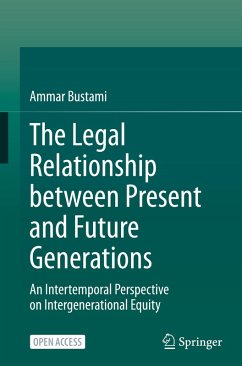The legal relationship between present and future generations is shaped by the concept of intergenerational equity. This concept and its structures of implementation are still controversial today. The present book examines two connected research questions. First, it analyses the legal contents and structures of the concept of intergenerational equity as of today. In this regard, the book addresses two manifestations of intergenerational equity: a general conception and a specific doctrine of intergenerational equity that both differ in their contents as well as their legally binding character. Furthermore, the operationalisation of the concept is still in progress as far as the respective duty-bearers and potential right-holders as well as means of representation are concerned. In this context, the various attempts and actual forms of representation of future generations in policy-making and international and national judicial proceedings are analysed and categorised. The first part of the book comes to the conclusion that intergenerational equity from a contemporaneous perspective is continuously evolving between lex lata and lex ferenda.
Therefore and second, the book examines which legal understanding the present generation would and should base its answer on from an intertemporal law perspective on the legal relationship between the present and the future. Starting from the existing doctrine of intertemporal law, this doctrine cannot be applied par for par to the concept of intergenerational equity due to formal as well as substantial reasons. The inherently intertemporal nature of intergenerational equity as well as the irreversible impacts of most intergenerational violations require a shift of perspective with regard to intergenerational equity. The book establishes a modified doctrine of intertemporal law that is adequately applicable to disputes on intergenerational equity.
This is an open access book.
Therefore and second, the book examines which legal understanding the present generation would and should base its answer on from an intertemporal law perspective on the legal relationship between the present and the future. Starting from the existing doctrine of intertemporal law, this doctrine cannot be applied par for par to the concept of intergenerational equity due to formal as well as substantial reasons. The inherently intertemporal nature of intergenerational equity as well as the irreversible impacts of most intergenerational violations require a shift of perspective with regard to intergenerational equity. The book establishes a modified doctrine of intertemporal law that is adequately applicable to disputes on intergenerational equity.
This is an open access book.








